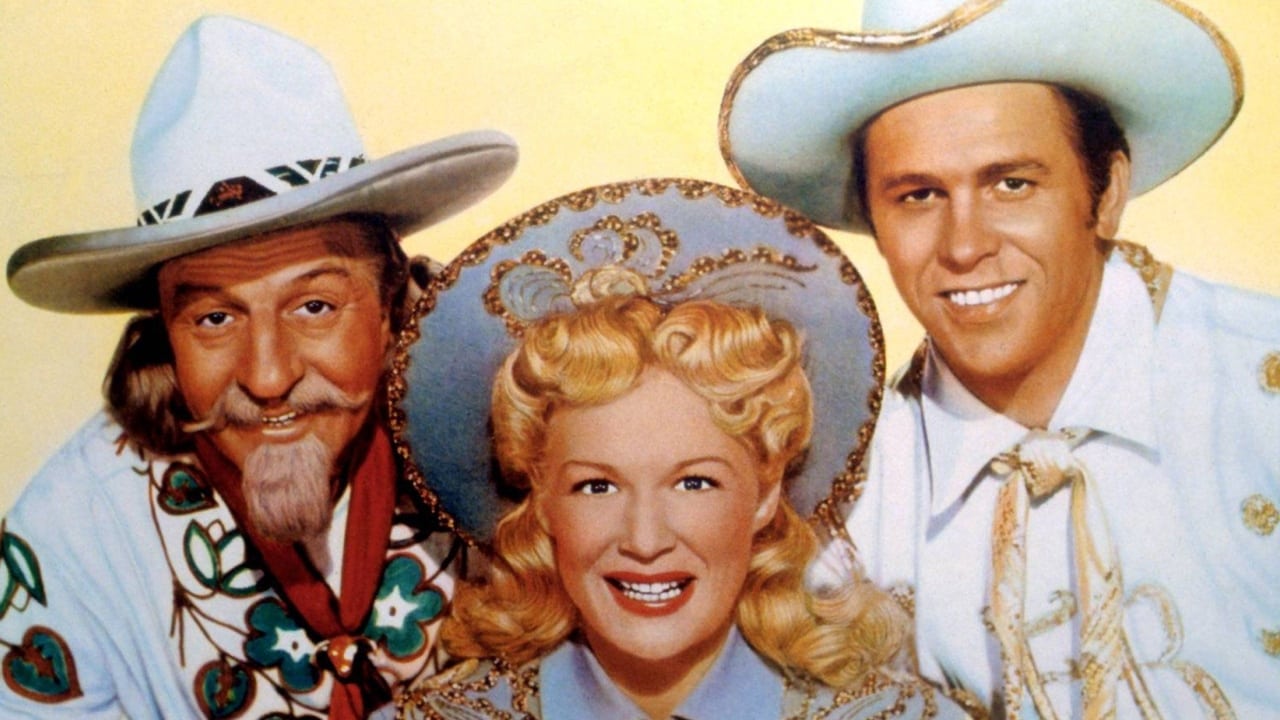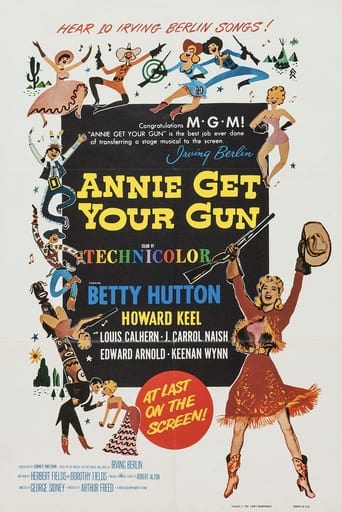ClassyWas
Excellent, smart action film.
Inadvands
Boring, over-political, tech fuzed mess
Baseshment
I like movies that are aware of what they are selling... without [any] greater aspirations than to make people laugh and that's it.
FirstWitch
A movie that not only functions as a solid scarefest but a razor-sharp satire.
George Redding
This movie, based on fact and, simultaneously, Annie Oakley's biography, is outstanding and heart-warming. Though it was in the tradition of musicals from the king of motion pictures, Metro-Goldwyn-Mayer, in addition to the musical numbers such as "Doin What Comes Nat'rally", and "The Girl That I Marry", and "There's No Business Like Show Business", the acting was superb. J. Carroll Naish was excellent as Sitting Bull, the tall and imposing Louis Calhern was convincing as Buffalo Bill, and the almost incomparable Howard Keel was his large self with his melodious voice, and thus was splendid as Frank Butler, whom Annie Oakley married in real life. Just as Annie Oakley "stole the show" in Buffalo Bill's Wild West Show, so Betty Hutton "stole the show" in this movie about the sharp-shooter herself. Hutton caused the populace to sense well what was Annie Oakley's character. Hutton had no trouble falling into the role, since in real life the actress herself was prone to temper tantrums. It was definitely her signature movie. She played two roles, the illiterate backwards country girl to someone who became sparkling all over the country and over much of Europe. On an unrelated note and yet also on a related note, the movie communicates the fact that anyone from anywhere and from any type of subculture can make of himself or herself anything he or she desires if the person puts the mind to it. The Technicolor was very beautiful and the scenes were beautiful. But again, Betty Hutton did for certain steal the show. Magnificent movie!
mark.waltz
Why do people quibble over the alleged sexism, racism and the censorship ripping political correctness of a 70 year old Broadway show and the slightly younger movie version? This is not the history channel presenting the "true" story of the sharpshooting Annie Oakley, but a tall tale based on someone's vision of what would make good entertainment and its investors some money in 1946, greatly increased when MGM bought the film rights. It serves its purpose, just like stories of Calamity Jane and Molly Brown did when they were adapted into musicals. Betty Hutton scored a triumph in 1950, just like Ethel Merman did four years before.Feisty, frenetic and funny, Hutton was an excellent choice to replace the ailing Judy Garland who honestly needed to be replaced because of her personal issues at the time. Hutton, wearing a ton of fake tanning cream, sings the heck out of Irving Berlin and Dorothy Fields' score, perhaps not ideal to her detractors, but celebrated by the public at large who made this her biggest screen success. Howard Keel's Frank Butler may not be an accurate account of the real long time partner and husband of Annie, but serves the role perfectly, appropriately macho when need be, and definitely romantic in his songs.There really is no business like show business, and when it's done right, it can be sensational even when far from perfect. A rousing ensemble opens the film with Keel, Keenan Wynn and Benay Venuta singing of Louis Calhern's colonel Buffalo Bill. Edward Arnold, Clinton Sundberg and J. Carroll Naish also add character to the supporting performances. At times, Hutton seems to be trying to out loud Merman in her singing (having been given the Merm treatment when she played a featured role opposite her in "Panama Battle" on Broadway), but does tone it down in the proper places, particularly "They Say It's Wonderful"). My favorite moment comes with "I Got the Sun in the Morning" which has a very energetic dance. I'm off of my p.c. bandwagon when I watch these old films with long gone ideals that present women as subservient and natives of American soil as savages or full of "ug" and grunts or half sentences. The supporting cast is very funny, the sings and dances rigorous and energetic, and the soft romantic scenes sweet. So I don't take this as definitive, but I'll take what I can get because even with ideals of an era long gone, they have more artistic merit and fun than the agenda driven manipulating dreck of the modern era.
Scott-101
The play is surely a classic (from what I've heard) but this is a pretty troubled film.For one, the misogynistic attitude of the Frank Butler character makes Seven Brides for Seven Brothers look progressive by comparison and Annie Oakley is portrayed as so stereotypically backwater that the Beverly Hillbillies would probably have boycotted this film. While we have to accept that cultural values have shifted just a little bit, some of the blame rests with the way Howard Keel and Betty Hutton approached their parts.I hate to say that because they were two of MGM's most underrated treasures but Hutton's aw shucks hillbilly demeanor was over-the-top and her overeffusiveness of Keel's Butler in the opening scene bordered on cartoonish (I was half-expecting a heart to start visibly beating out of her chest like Pepe le Pew). Similarly, Keel's Butler seemed to have little more than a passing interest in Hutton's Annie Oakley and it never really felt like a love story in that respect. Without the chemistry, the film falls apart because it almost seems like Oakley has an unhealthy obsession with this Frank Butler who kissed her once but otherwise treated her like either dirt and Buffalo Bill is just an enabler.The number "Anything you can do I can do better" is still a showstopper and "You Can't Get a Man with a Gun" still has some enthusiasm although Hutton's hillbilly diction takes away from it. The film has many of the trademarks of the MGM films of the era with the rich color palette, lavish period details, and orchestral backing to the songs.
vincentlynch-moonoi
This is another of those films that I had avoided for years...just didn't suit my tastes. But recently I moved to Colorado and had visited the real Buffalo Bill's grave west of Denver, so my interest was piqued a bit. I have to admit, although some might consider it corny, that this was one heck of a film. It's loosely based on the life of sharpshooter Annie Oakley, and it's helpful to real the "Wikipedia" entries on the film and the major characters. Fictionalized, you bet. But, when you read the real background of Oakley (and others), you'll "get" things in the film you otherwise wouldn't. There's more than a grain of truth here, but you still wouldn't call it historical.This MGM release has stunning color, and of course a wonderful score by Irving Berlin. Interestingly, the role of Annie Oakley was to be played by Judy Garland, whose emotional problems led to her release from the film. All the better. Betty Hutton gives a bravura performance, and though footage of Garland has been released and is good, Hutton is ideal for this role. Disappointingly, Frank Morgan was to play Buffalo Bill, but died; Louis Calhern does a nice job in what is a very different role for him. Edward Arnold, long after his peak as a leading man, plays a fine character role as Pawnee Bill. Howard Keel is fine as the romantic lead (in his film debut), and Keenan Wynn is fine in a supporting role.This is an infectious movie that it's difficult not to like. The strength of the Hutton performance is stunning. As the film's premiere number says, there's no business like show business!

